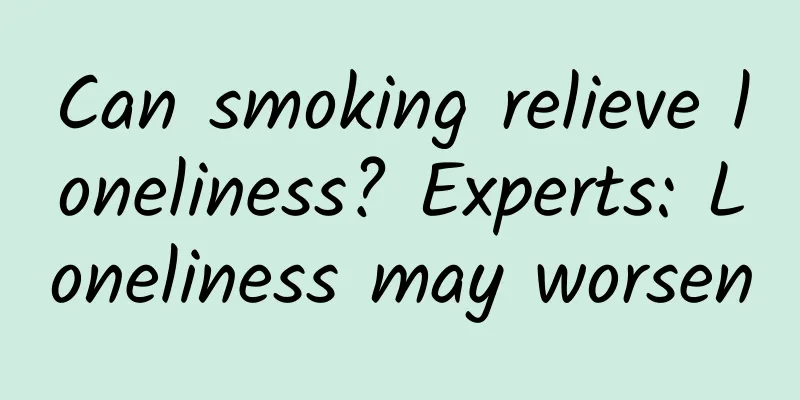Can smoking relieve loneliness? Experts: Loneliness may worsen

|
Friends who smoke often tell me that they smoke to get rid of loneliness and escape solitude. But can smoking really reduce loneliness? Copyright image, no permission to reprint Smoking may worsen loneliness, depression, anxiety After smoking, the nicotine in tobacco enters the brain through the lungs and acts on the nicotine receptors in the brain. The dopamine produced can bring excitement and pleasure to the brain, but when this part of dopamine is exhausted, smokers will experience depression. At this time, they often need to smoke more tobacco and take in more nicotine to maintain the release of dopamine. But correspondingly, it will also lead to more depression. Once you fall into such a vicious cycle, you will suffer from depression and anxiety. Copyright image, no permission to reprint After repeated stimulation of nicotine, the brain will also undergo some irreversible changes. An interesting study found that when smokers looked at pictures of delicious food, some brain areas were less activated than those of non-smokers. A study found that among patients with acute myocardial infarction, smokers were more likely to suffer from depression and anxiety. Nicotine exposure during adolescence may have adverse effects on the brain The limbic system, which controls cognition, emotion, and reward, matures during adolescence and is susceptible to the long-term effects of nicotine. Abnormal activation of nicotinic acetylcholine receptors during adolescence can trigger persistent changes in neuronal signaling. Copyright image, no permission to reprint Multiple animal experiments have shown that chronic exposure to nicotine during adolescence leads to long-term deficits in learning and cognitive processes, such as decreased attention and memory, and increased impulsivity and anxiety. Smoking linked to greater social isolation, loneliness A 12-year follow-up study of more than 9,000 people published in The Lancet found that smoking leads to more severe social isolation and stronger loneliness than non-smokers. Smokers communicate less with their families and participate less in social activities, and this situation worsens with older smoking years. Tobacco dependence and negative emotions such as depression are mutually causal, creating a vicious cycle. In fact, in addition to the mental factors such as depression and anxiety that smokers themselves may experience, passive smokers will also be affected. Many studies have shown that pregnant women who are passive smokers are more likely to experience mental states such as anxiety and depression. Copyright image, no permission to reprint There is an old Chinese saying that drinking to drown your sorrows only makes you more sorrowful. In fact, smoking to relieve loneliness will only make you more lonely. The correct way is to quit smoking as soon as possible, participate in more social activities, or even seek help from a psychologist. Source: People's Daily Online - Science Popularization China The cover image of this article is from the copyright gallery, and the image content is not authorized for reproduction |
<<: Metallic hydrogen is about to be "ruined"
>>: They are the unsung heroes behind the exploration of manned spaceflight in the last century
Recommend
From decision trees to random forests: the principle and implementation of tree-based algorithms
In this article, we will cover the mathematical d...
It's as smooth as iOS and as stable as Android, so why doesn't anyone use it?
Among the world's three major mobile operatin...
New media operation: How to build a self-media matrix?
Many students would say: It’s 2020, can self-medi...
Perfect Diary’s private domain traffic method!
The article provides a detailed analysis of the t...
How to make a brand marketing plan? I put together a how-to manual!
This is a brand marketing operation manual that I...
How will Baidu, Toutiao and Weibo fight in the information flow advertising battlefield?
1. The Warring States Period of Information Flow ...
The deposit reserve ratio has been lowered again! What does this mean?
On Monday, the People's Bank of China announc...
Resources|The most complete H5 sound effects library material website recommendation
When it comes to H5-related sound effects, many p...
Albert follows Friends and speaks English easily in 100 days
Albert follows Friends and speaks English easily ...
Why can’t Douyin influencer promotion be charged based on results?
Whether it is performance advertising or brand ad...
Xiao Ying – Rhythm training class for musicians
Xiao Ying - Musicians' Rhythm Training Course...
APP operation: 4 ways to implement growth hacking!
Operation is an art and even more a technology. I...
Qianhang "How to sell furniture on Xianyu using free traffic"
Qianhang's resource introduction of "How...
5 hidden details in WatchKit
There are only a few months left before the offic...









